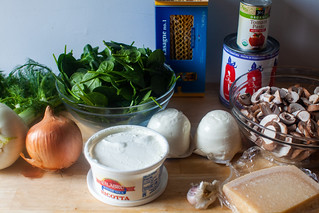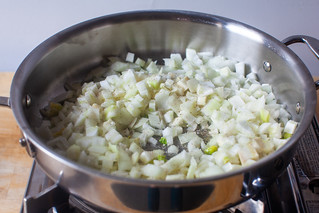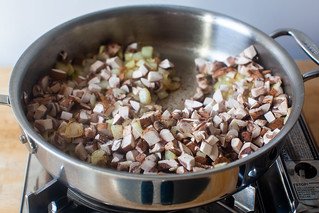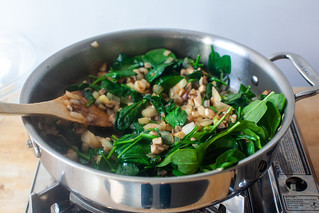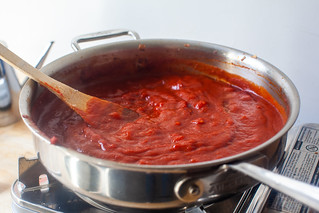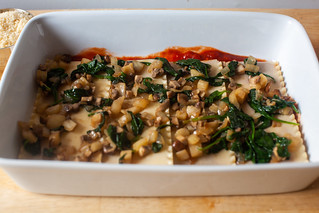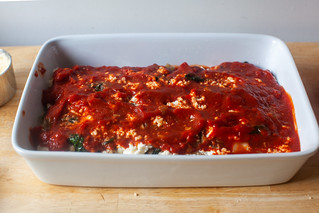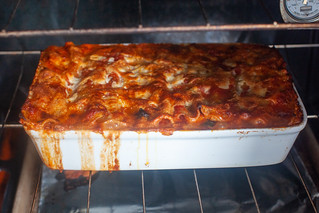Here is a theory: There are two types of picky people, those that are totally fine just never experiencing a life with, I don’t know, tomatoes or bananas or pickles or raisins (yes, I’ve read your comments — all of them) and then there is the kind that finds their epicurean limitations to constrict like an uncomfortable jacket they’d love to shed if they could figure out how. I, a lifelong Picky Person, am the latter. Over the years creating and sharing recipes for this site, I’ve embraced so many things I once thought I didn’t like [insert basically half the ingredients in anything here, ever], but it turned out I just didn’t like the way they were usually made.
And now the time has come for me to get over my lasagna issues. What are you saying? you might ask. There are two lasagna recipes in the archives. You love them both! And it’s true. What I have struggled with is what I’d call The Usual Vegetable Lasagna. I want something as bubbling, bronzed, and brick-like as a classic lasagna should be, but I needed to fix a few things along the way.
– Most vegetable lasagna recipes are meat lasagnas with a footnote that you can just leave the meat out. But I wanted one that celebrated the presence of vegetables, a lot of them. And I wanted us to be able to choose our own vegetable adventure based on what we could get and what we like. Here, I use 4 diced cups of mushrooms, onions, and fennel, plus spinach. In the summer it might be zucchini and eggplant. You pick what you like with sauce, cheese, and pasta.
– I know it’s just me, but I find no-boil lasagna noodles too thin and unacceptably bereft of ruffly edges. But I also hate boiling lasagna noodles, which. as we all know, stick to everything and also themselves and you spend a good 15 minutes peeling and tearing them to get them spread in a pan and wondering why you didn’t just make baked ziti, which would never do you like this. I don’t know why it took me so long to just use the lasagna noodles I like and soak them in hot tap water for 10 minutes and letting the rest happen in the oven, but I finally did and will never make lasagna from dried noodles another way again.
– I’ve never liked the texture of baked ricotta. Fresh ricotta is pure bliss, of course, but it gets so grainy and dry when baked with sauce and noodles, I was happy to use a smooth, rich bechamel instead. (Both previous lasagnas are bechamel lasagnas.) But here I experimented with adding some heavy cream to ricotta to keep it from baking up dry and really liked the effect. You may not need or want it here, but if the above mimics your feelings about lasagna, you’re in for a treat.
– My last quibble with many lasagna recipes is the height. Quite often, hearty lasagna recipes call for less than a pound of noodles, building 4, instead of 5, layers, which settle into a nice but kind of squat lasagna. I’d prefer a full five tiers — a beautiful thing to behold, especially when the top layer is crackly with bronzed melted cheese over a thin slick of garlicky tomato sauce. Well, I learned why. The former fits nicely in a standard 9×13-inch baking dish with 2.5-inch sides. The latter appears to and then your oven floor tells you a different story. So, this is where the story was supposed to end: me muttering under my breath about the burning smell, chalking the lasagna up to a failure. But, I mean, it’s not like it was going into the trash. I waited about 45 minutes to cut into it, which is a great thing to do if you don’t like burning your mouth of food; it also gives the lasagna time to set up. Instead of finding a sloshy mess inside, I found nirvana: no extra liquid, no sog, just a perfectly set up, sky-high lasagna masterpiece. We need this. We want this. We should not compromise. Bake it over a tray to catch drips and you won’t have to, either.
Note: You can watch an Instagram demo of this recipe here.
Previously
Six months ago: Ultimate Zucchini Bread and Black Pepper Tofu and Eggplant
One year ago: Bodega-Style Egg and Cheese Sandwich and Chocolate Puddle Cakes
Two years ago: Slow-Roasted Sweet Potatoes and Korean-Braised Short Ribs
Three years ago: Small-Batch Tiramisu
Four years ago: Miso Black Sesame Caramel Corn and Hot and Sour Soup
Five years ago: Oven-Braised Beef with Tomatoes and Garlic and Pecan Sticky Buns
Six years ago: Chocolate Hazelnut Linzer Hearts and Chocolate Peanut Butter Cheesecake
Seven years ago: Italian Stuffed Cabbage
Eight years ago: Lasagna Bolognese
Nine years ago: Blood Orange Olive Oil Cake
Ten years ago: Best Cocoa Brownies and Chana Masala
Eleven years ago: Chocolate Whiskey and Beer Cupcakes and Crispy Black Bean Tacos with Feta and Slaw
Twelve years ago: Seven-Yolk Pasta Dough and Best Chocolate Pudding
Thirteen years ago: For Beaming, Bewitching Breads
Perfect Vegetable Lasagna
I consider this at its core a classic red sauce and ricotta lasagna recipe, the kind you make for friends and family, the kind you make two of at once so you can freeze the other. If you like your lasagna on the very cheesy side (this is cheesy, but not heavily cheesy), you might increase the mozzarella to 1 1/2 pounds. I buy mozzarella that’s been packaged tightly in plastic, not the kind in water, for baked pastas. For the 4 cups of diced vegetables, use what you can get or what you love. I got about 2 cups from 8 ounces of sliced mushrooms (that I further diced) and 2 cups diced fennel (from a medium bulb). I’d definitely use peppers, zucchini, eggplant, or even broccoli here too.
- 4 tablespoons olive oil, divided
- 1 large yellow onion, diced small
- 4 cups small-diced (about 1/2-inch pieces) vegetables (see Note)
- 5 ounces baby spinach or another green you like, roughly chopped
- Kosher salt and freshly ground black pepper
- 3 garlic cloves, finely chopped
- Red pepper flakes
- 1 teaspoon dried oregano
- 1 6-ounce can tomato paste
- 1 (28-ounce) can crushed tomatoes
- Handful chopped fresh basil (optional)
- 1 pound dried lasagna noodles (not no-boil type)
- 1 pound (2 cups) whole milk ricotta
- 1/4 cup heavy cream (optional)
- 1 pound coarsely shredded low-moisture mozzarella
- 1 cup (4 ounces) finely grated parmesan
Vegetables and sauce
Assembly
Make the sauce: In the same pan, heat remaining 2 tablespoons olive oil. Add garlic, a couple pinches of red pepper flakes and up to a full teaspoon if you want it spicy, and oregano and cook together for 30 seconds to 1 minute, until the garlic is just barely golden. Add tomato paste (save the can) and cook for 3 to 4 minutes, don’t worry if it seems to be drying out. Add tomato paste cans of water (1 1/4 cups) and stir up any stuck bits, cooking until smooth. Add canned tomatoes, 1 teaspoon salt and basil, if you’re using it. Simmer mixture together for 4 to 5 minutes; adjust seasonings to taste. You’ll have 4 cups of sauce.
Assemble lasagna: Heat oven to 400 degrees F. Place lasagna noodles in a large bowl or baking dish and cover with the hottest tap water you can get. Soak for 10 minutes. Mix mozzarella and parmesan. Mix ricotta with heavy cream, if you want to keep it as creamy as possible (skip cream if this doesn’t bother you) and season the ricotta with some salt and black pepper.
Coat a 9×13 baking dish at least 2.5 inches deep and ideally 3 inches deep lightly with oil or nonstick spray. Pour 1/3 sauce and spread it evenly. Shake water off noodles and arrange your first layer of noodles, slightly overlapping their edges.
Dollop 1/4 of the ricotta (about 1/2 cup) over noodles and spread it in an even layer with a spoon or spatula. Add 1/4 of vegetable mixture, then about 1/5 of mozzarella-parmesan mixture (just eyeball it). Pour a scant cup (more than 3/4 cup, less than 1 cup) of sauce evenly over cheese. Place next layer of noodles on top. Repeat this process (1/4 of ricotta, 1/4 of the vegetables, 1/5 of the mozzarella-parmesan, scant 1 cup of sauce) three times, using up all but the mozzarella-parmesan mixture and about 1/3 cup of the sauce.
Place final layer of noodles on top, spread the remaining sauce thinly over it and scatter the top with the remaining mozzarella-parmesan mixture.
Bake lasagna: Cover a large tray with foil (for easy cleanup) and place baking dish on top of it. Lightly coat a piece of foil with nonstick spray and tightly cover baking dish with foil, oil side down. Bake with the foil on for 30 minutes, or the pasta is tender — a knife should easily go through. Remove foil (carefully, so carefully) and bake for another 20 minutes, until lasagna is golden on top and bubbling like crazy. Keep it in the oven another 5 minutes for a darker color.
Wait, then serve: The best lasagna has time to settle before you eat it. When it comes out of the oven, it might seem like it’s a sloshy mess, but 45 minutes later (mine is always still very hot, but you might need less time in a cold kitchen) it will be glorious — the excess water absorbed into the noodles and filling, and ready for a relatively clean slice.
Serve in big squares.
Do ahead: Leftovers should stay in the pan. I like to reheat lasagna with the foil off because I like it when the top gets very dark.

